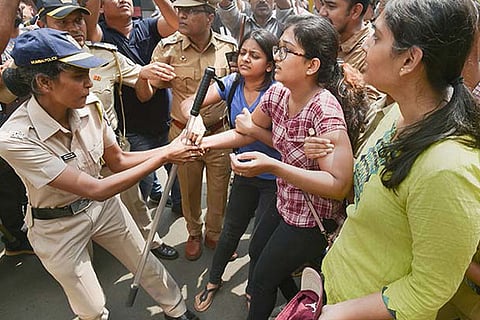

Chennai
The constant turbulence, protests, assemblies voicing their dissent against the state’s laws and policies on the streets throughout the length and breadth of our country is a sign of vibrant democracy. But the way the state, the Executive and the Judiciary are dealing with them is of grave concern.
We the people of India have pledged to ourselves a sovereign socialist secular democratic republic by our Constitution that guarantees free speech and peaceful assembly as fundamental rights, among others. The elected politicians / ministers and the judges of the Supreme Court and high courts in India are inducted into their office after taking oath to abide by the constitutional values. They solemnly affirm and swear that they will bear true faith and allegiance to the Constitution of India as by law established, that they will uphold the sovereignty and integrity of India, etc.
Reality is, however, far from the above pledge / oath. Today, our country is moving away from secular democratic values. Fortunately, not just the academicians and the intelligentsia but the commoners have also understood the design of the Centre and have started vociferously opposing the same. Unable to accept even expression of dissent, the police are using its force to silence people with not merely false and untenable cases but subjecting even children to hours and hours of questioning. There is an atmosphere of fear and terror unleashed by the police constantly by the police. No permission is granted for any gathering to talk about the Citizenship (Amendment) Act (CAA), the National Register of Citizens (NRC) or the National Population Register (NPR).
The courts remain silent spectators by failing to take suo moto cognisance of the blatant violations of the fundamental rights of the people. Media, by and large, is silent about corruption and nepotism and misinterprets the assemblies of even those who just observe silence and stand up to uphold the Constitution. A silent padayatra and reading of the preamble of the Constitution on Martyrs’ Day in the Madras High Court by lawyers and three retired high court judges has been seen as a security threat.
With perjury not being a serious offence, the Deputy Commissioner of Police informed the High Court, as quoted in suo moto WP No 29197 of 2015, that “they (the assembly) were stopped and advised for their unauthorised activities. But they refused to hear the police officers who were on duty.” No officer stopped or advised those gathered as alleged. In fact, the police officers said that the judges and advocates were doing “good”. They took photographs with some of those gathered and silently marched with the gathering. The padayatra started at the Aavin gate and ended there. But the police report says that it ended near Dr Ambedkar’s statue.
In a press statement on the said issue of padayatra, senior advocates of the Madras High Court said, “It is a sad reflection on the state of our democracy that a peaceful padayatra to commemorate the Father of our Nation on Martyrs’ Day has been portrayed by the police as an ‘unauthorised activity’ by lawyers and retired judges inside the High Court”. “To describe a peaceful padayatra to honour Gandhiji as an unlawful protest is an insult to the Mahatma,” they added. “The participants did not go anywhere near the high court building nor was there any disruption of functioning of any court,” it was further said.
Thus the State and the Judiciary are now alienating the public and seeing them as enemies. Colonial mindset is seen clearly in administration, with the police abusing all its power to silence people. The Judiciary is physically inaccessible by the closing of its gates with high security measures. Tapping its doors by litigants in person are regulated by rules that deter the voicing of grievances by the victims themselves. Public interest litigants are subject to such scrutiny and submissions that they have to be afraid of repercussions of filing any affidavit.
India cannot and ought not to be proud of being a populous democracy; to be a proud democracy, it has to ensure that the administration of its polity and justice ought to be fair and praiseworthy. After all, as Amartya Sen said, “The success of a society is to be evaluated primarily by the freedoms that members of the society enjoy.”
—The writer is SeniorAdvocate, Madras High Court
Visit news.dtnext.in to explore our interactive epaper!
Download the DT Next app for more exciting features!
Click here for iOS
Click here for Android